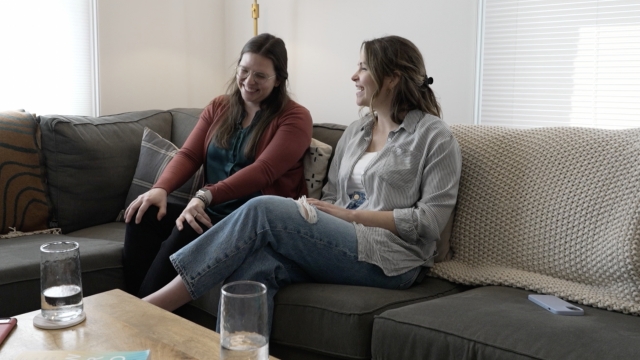Rebekah Maxwell and her sister, Hannah Riether, have endometriosis - an extremely painful disease with no cure. They were both diagnosed in their mid to late twenties after years of being dismissed by doctors and being told their pain was normal.
“I had a lot of symptoms in college. Probably starting around, like, 18, 19, where I just couldn't go to class because I was in so much pain,” said Riether.
Riether had excision surgery in 2022, the gold standard to treat endometriosis, where the disease is removed from the root to help with symptoms after her sister recommended the surgery. It's the same surgery Maxwell had to treat her symptoms.
The condition has caused them to put some of life's moments on hold. Meanwhile, their bond has only grown stronger.
Endometriosis is a condition in which cells that are somewhat similar to the lining of the uterus are found elsewhere in the body causing painful periods, chronic pelvic pain and a number of other symptoms.
Frustrated by the lack of awareness and misinformation on the disease, the sisters decided to take matters into their own hands and established Endo-Sisters Nashville, a support group in 2022 for individuals to connect, share experiences and support one another. The group meets on the first Saturday of every month.
"It's Endometriosis Awareness Month. So our first meeting in March, we were talking about endometriosis awareness and how we interact with people in our workplaces or in our family. We talked about how either you create space to share or you don't feel comfortable sharing, or how do you, if you have dietary restrictions, how do you deal with dietary restrictions when you are with your family gatherings? Is that a point of contention? Maybe talking through that type of stuff," said Riether.
"It's truly a support group where you can share medical trauma. And we can hold space for each other because we get it," said Maxwell.
SEE MORE: New study shows menstrual cycles may affect suicide risk
Endometriosis advocacy groups have been pushing to raise awareness and dismantle myths about the disease.
Lindsey Peters, an ambassador for the Endometriosis Association and someone who's struggled with endometriosis herself, has made it her life goal to educate others about the disease — including meeting with legislators on Capitol Hill to advocate for more funding for endometriosis research.
"Women still aren't being taken seriously about endometriosis, and that's why we don't have the research. We don't have the funding. We don't have a cure for this illness. We don't have the doctors for it," said Peters.
According to the Endometriosis Foundation of America,endometriosis affects an estimated 1 in 10 women worldwide and can take an average of 7 to 10 years to get diagnosed.
Laparoscopic surgery is currently the only way to detect most cases of endometriosis.
Dr. Wendaline VanBuren, a Mayo Clinic radiologist who specializes in gynecologic imaging, says imaging for endometriosis is a great diagnostic tool and plays a key role in improving endometriosis treatment.
"The more we understand, the more we teach, the more we show, the more people are going to realize, yes, imaging does an amazing job of diagnosing and categorizing the disease. Not just that, but also monitoring disease," said VanBuren.
But until widespread advancements are made across the board and more research is dedicated to endometriosis, support groups like the one in Nashville continue to play a crucial role as women around the world fight for answers.
"We protect each other. I think that was why I wanted to start the group, is because I'd received so much misinformation and it took me way too long to get diagnosed. And so if I could keep anyone from having the amount of pain that I was in, then it was worth it," said Maxwell.
Trending stories at Scrippsnews.com



